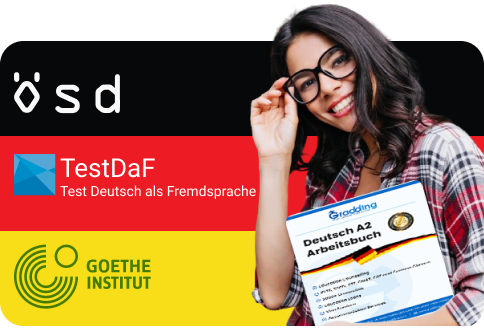Mastering the German language is an enriching journey, and for those aiming to showcase their proficiency, German language exams provide a structured means of validation. In this detailed exploration, we will navigate the complexities of various German language exams, delving into their structures, levels, and the skills they evaluate.
Syllabus For German Language Profeciency
A syllabus for German language proficiency typically follows the guidelines of the Common European Framework of Reference for Languages (CEFR) and can be adapted based on the specific needs of learners.
A1 (Beginner)
- Listening: Basic comprehension of common expressions.
- Speaking: Introducing oneself and engaging in simple conversations.
- Reading: Understanding short, simple texts.
- Writing: Formulating simple sentences and writing short messages.
A2 (Elementary)
- Listening: Understanding simple conversations and announcements.
- Speaking: Participating in basic conversations and giving simple directions.
- Reading: Understanding texts with concrete information.
- Writing: Composing short paragraphs and basic letters.
B1 (Intermediate)
- Listening: Understanding conversations on familiar topics.
- Speaking: Engaging in conversations on various subjects.
- Reading: Extracting details from texts related to work and leisure.
- Writing: Composing coherent texts on familiar topics.
B2 (Upper Intermediate)
- Listening: Understanding complex spoken texts.
- Speaking: Conducting discussions, presentations, and interviews.
- Reading: Analyzing articles, essays, and literary texts.
- Writing: Producing well-structured essays and reports.
C1 (Advanced)
- Listening: Understanding complex spoken language in academic and professional contexts.
- Speaking: Engaging in complex discussions and delivering sophisticated presentations.
- Reading: Analyzing and interpreting complex texts.
- Writing: Producing well-argued essays and formal documents.
C2 (Proficient)
- Listening: Understanding complex spoken language in diverse contexts.
- Speaking: Participating in advanced debates and delivering sophisticated presentations.
- Reading: Analyzing complex literary and academic texts.
- Writing: Producing advanced-level essays and research papers, crafting sophisticated formal documents.
Exams For German Language Profeciency
1. Goethe-Zertifikat Exams:
Levels: A1, A2, B1, B2, C1, C2
Skills Assessed: Listening, Reading, Writing, Speaking
Purpose: Issued by the Goethe-Institut, these exams are recognized globally. They assess proficiency at different levels, from beginner to advanced, and are suitable for academic, professional, or personal goals.
2. TestDaF (Test Deutsch als Fremdsprache):
Levels: TDN 3-5 (Test Levels 3-5)
Skills Assessed: Listening, Reading, Writing, Speaking
Purpose: Specifically designed for those aiming to study at German universities, TestDaF assesses language proficiency with scores ranging from TDN 3 (modest user) to TDN 5 (very good user).
3. Telc Language Exams:
Levels: A1 to C2
Skills Assessed: Listening, Reading, Writing, Speaking
Purpose: Telc offers a range of language exams suitable for different proficiency levels. These exams are recognized by educational institutions and employers globally.
4. DSH (Deutsche Sprachprüfung für den Hochschulzugang):
Levels: Typically equivalent to C1
Skills Assessed: Listening, Reading, Writing, Speaking
Purpose: DSH is a language proficiency test required for university admission in Germany. It is commonly taken by international students who wish to study in German-speaking universities.
5. ÖSD (Österreichisches Sprachdiplom Deutsch):
Levels: A1 to C2
Skills Assessed: Listening, Reading, Writing, Speaking
Purpose: The ÖSD offers a variety of exams for different proficiency levels, recognized in Austria and beyond. These exams cater to academic, professional, and general language proficiency goals.
6. Zertifikat Deutsch für den Beruf (ZDfB):
Levels: B1, B2, C1
Skills Assessed: Listening, Reading, Writing, Speaking
Purpose: ZDfB assesses German language skills in a professional context. It is particularly relevant for those seeking employment opportunities in German-speaking workplaces.
7. Fit in Deutsch (Goethe-Zertifikat A1 für Kinder, A2, B1 Jugendliche):
Levels: A1, A2, B1
Skills Assessed: Listening, Reading, Writing, Speaking
Purpose: Designed for younger learners, these exams assess language proficiency for children and teenagers. They are aligned with the Common European Framework of Reference for Languages (CEFR).
Conclusion:
German language exams serve as gateways to academic, professional, and personal opportunities in the German-speaking world. Whether pursuing Goethe-Zertifikat, TestDaF, Telc, or other exams, a strategic and well-rounded approach to language practice is key. Success in these exams not only validates language proficiency but also opens doors to a world of cultural richness and global communication. As you embark on the journey of mastering the German language, remember that each exam is not just a test; it is a celebration of linguistic achievement and cultural appreciation. Viel Erfolg! (Good luck!)
NA
Explore Experienced Instructors




 Know Everything about German Language Exams from Experts
Know Everything about German Language Exams from Experts